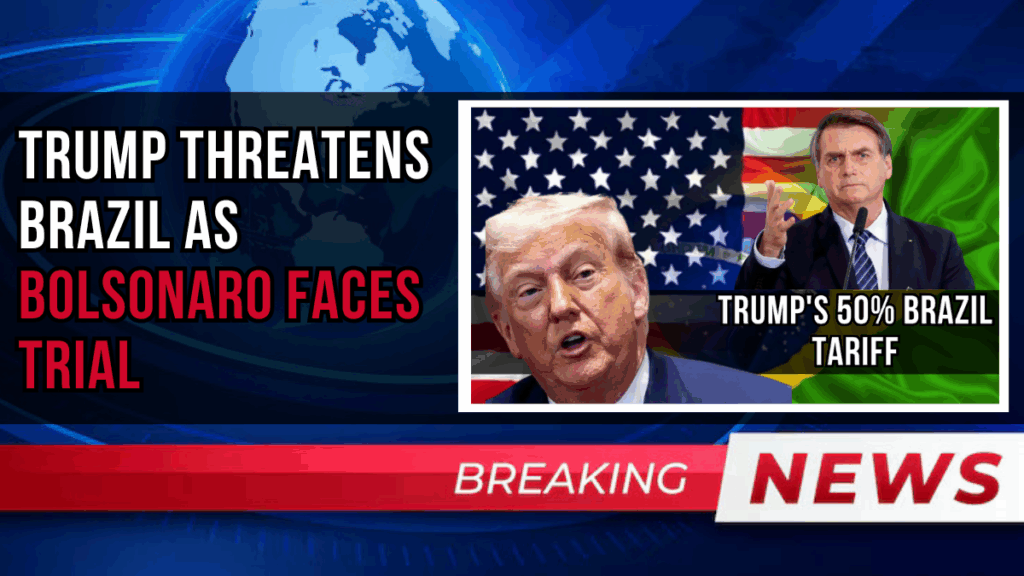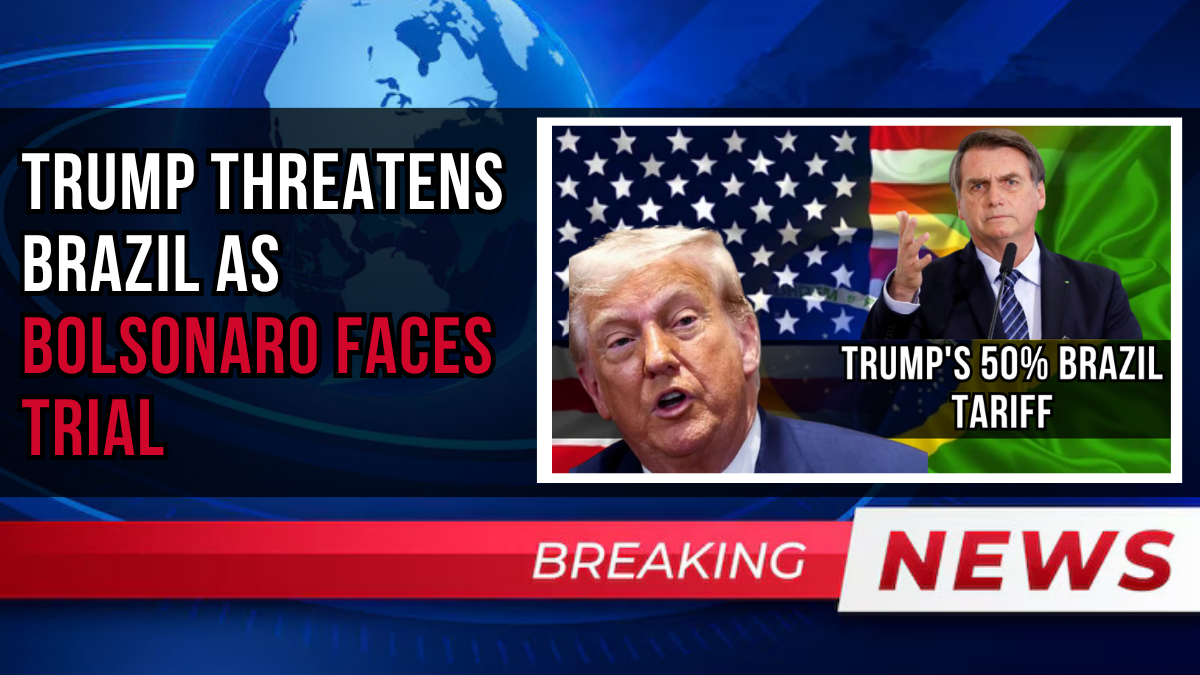US President Donald Trump’s latest tariff announcement has shaken global markets and diplomatic relations. On July 9, 2025, Trump imposed a staggering 50% tariff on Brazilian goods, but this wasn’t about trade imbalances or economic competition. Instead, Trump explicitly tied the punitive measure to what he called a “witch hunt” trial against his political ally, former Brazilian President Jair Bolsonaro.

This unprecedented move marks a significant shift in how Trump uses tariffs as foreign policy tools. Rather than focusing purely on economic grievances, the president is now leveraging America’s economic power to influence other nations’ domestic legal proceedings.
The Bolsonaro Connection
Trump’s tariff letter to Brazilian President Luiz Inácio Lula da Silva made his motivations crystal clear. The US president condemned Brazil’s treatment of Bolsonaro as an “international disgrace” and demanded that the trial “should end IMMEDIATELY!”
Bolsonaro faces serious charges including involvement in an armed criminal organization and attempted violent abolition of democratic rule of law. Brazilian prosecutors allege he orchestrated a coup attempt to overturn his 2022 election loss to Lula.
The personal relationship between Trump and Bolsonaro runs deep. Trump has repeatedly described the former Brazilian leader as a friend and even hosted him at his Mar-a-Lago resort in 2020 when both men held office. This friendship now appears to be driving US trade policy.
Brazil Fights Back
Brazil didn’t take Trump’s economic pressure lying down. President Lula immediately announced that his country would invoke its Economic Reciprocity Law, which allows Brazil to suspend trade, investment, and intellectual property agreements with countries that harm its competitiveness.
“Brazil is a sovereign country with independent institutions that will not accept being taken for granted by anyone,” Lula stated firmly. He also challenged Trump’s claims about trade imbalances, noting that the US has maintained a trade surplus of over $410 billion with Brazil over the past 15 years.
The Brazilian government also summoned the US charge d’affaires to formally protest Trump’s interference in their judicial system. This diplomatic escalation signals that Brazil views Trump’s actions as a serious breach of international norms.
Market Impact and Currency Chaos
Financial markets reacted swiftly to Trump’s announcement. The Brazilian real plummeted more than 2% against the US dollar as investors fled Brazilian assets. This currency volatility demonstrates the real-world consequences of Trump’s politically motivated trade policies.
The 50% tariff rate is particularly severe compared to other countries in Trump’s recent tariff campaign. Most other nations have received duties ranging from 20% to 40%, making Brazil’s punishment notably harsh.
A Pattern of Judicial Interference
Trump’s intervention in the Bolsonaro case follows a similar pattern seen with Israeli Prime Minister Benjamin Netanyahu. Trump recently called Netanyahu’s corruption trial a “travesty of justice” and demanded it be halted an unprecedented intervention in an ally’s judicial system.
The White House later claimed Trump was “simply emphasizing his empathy” for Netanyahu. However, this explanation rings hollow when Trump consistently uses his presidential platform to attack legal proceedings against his political allies.
Beyond Personal Politics
Trump’s Brazil tariff reveals several troubling trends in his trade policy approach:
Economic nationalism takes a backseat to personal relationships. The US actually runs a trade surplus with Brazil, undermining Trump’s usual justification for tariffs based on trade imbalances.
Diplomatic norms are being weaponized. Using economic pressure to influence another country’s legal system crosses traditional boundaries of international relations.
Market stability becomes secondary. The immediate currency volatility shows how Trump’s impulsive decisions can destabilize global financial markets.
Global Trade War Escalation
The Brazil tariff is part of Trump’s broader campaign of economic pressure. Since July 7, he has sent similar letters to over 20 countries, including key allies like Japan and South Korea. The president has also announced sector-specific duties on steel, aluminum, and automobiles.
Trump’s tariff letters typically threaten further escalation if countries retaliate and urge foreign manufacturers to relocate production to the United States. This approach aims to use economic coercion to reshape global supply chains in America’s favor.
Economic Experts Sound Alarm
Most economic analyses suggest Trump’s tariff strategy will backfire. Economists warn that the widespread duties will increase inflationary pressures, reduce economic growth, and harm American consumers who ultimately pay these costs through higher prices.
The Brazil case is particularly problematic because it lacks any economic rationale. When tariffs are driven by personal political grievances rather than strategic trade considerations, they become tools of arbitrary power rather than effective policy instruments.
What This Means for Global Relations
Trump’s Brazil tariff sets a dangerous precedent for international relations. If the US can impose severe economic penalties on countries whose judicial systems it dislikes, what prevents other major powers from doing the same?
This approach undermines the rules-based international order that has facilitated global trade and economic growth for decades. Countries may begin to view trade relationships as inherently unstable if they can be disrupted by political whims.
Looking Ahead
The Brazil-US trade dispute shows no signs of quick resolution. With Trump threatening additional escalation if countries retaliate, and Brazil preparing reciprocal measures, this conflict could spiral into a broader economic confrontation.
The situation also raises questions about how other countries will respond to Trump’s increasingly aggressive trade tactics. Will they seek to diversify away from US markets, or will they bow to economic pressure?
The copper tariff announced alongside the Brazil measures justified on “national security” grounds suggests Trump is preparing to use similar rationales for broader economic restrictions.
The Bigger Picture
Trump’s 50% Brazil tariff represents more than just another trade dispute. It signals a fundamental shift toward using economic power as a tool of personal and political influence rather than strategic national interest.
This approach threatens to undermine America’s long-term economic relationships and global leadership. When trade policy becomes hostage to personal grievances, it loses its effectiveness as a tool of statecraft and economic development.
As global markets continue to react to Trump’s unpredictable trade moves, one thing becomes clear: the traditional boundaries between economics, politics, and personal relationships are rapidly dissolving in the current administration’s approach to international relations.
The Brazil case may be just the beginning of a new era where trade wars are fought not over economic interests, but over political loyalties and personal friendships. For global economic stability, this represents a troubling development that could reshape international commerce for years to come.
FAQs: Trump’s 50% Tariff On Bolsonaro
Q. What is the reason behind the 50% tariff on Brazil?
A. The tariff was implemented as a response to the legal trial of former Brazilian President Jair Bolsonaro. It is seen as a strategic move to exert economic pressure on Brazil to potentially influence the outcome of the proceedings.
Q. How does this tariff differ from previous trade measures?
A. Unlike traditional tariffs, which are usually imposed for economic or trade imbalance reasons, this tariff is politically motivated. It is being used as a tool to address political and legal matters in another country.
Q. What could be the global implications of this tariff?
A. This sets a precedent for using economic policies to influence political outcomes abroad, which could destabilize international trade norms and spark retaliation or similar measures from other nations.
Q. How will this tariff affect Brazil’s economy?
A. The immediate impact would likely be felt in Brazil’s export market, especially industries heavily reliant on trade with the U.S. A 50% tariff raises costs significantly, making Brazilian goods less competitive.
Q. What does this mean for U.S.-Brazil relations?
A. This tariff could strain relations between the two countries, as it injects additional tension into diplomatic and economic ties already facing challenges due to differing political agendas.
Click HERE For More

